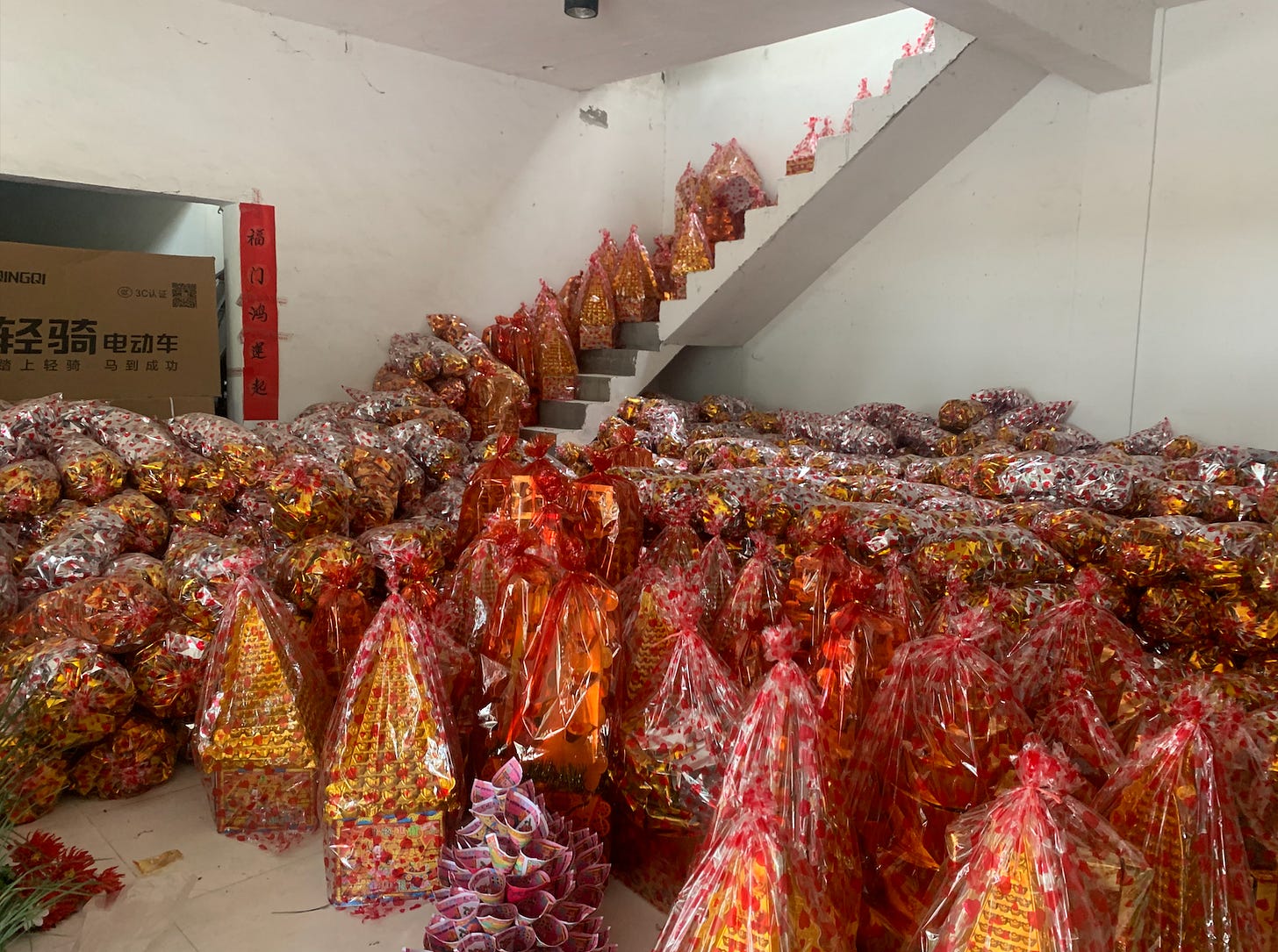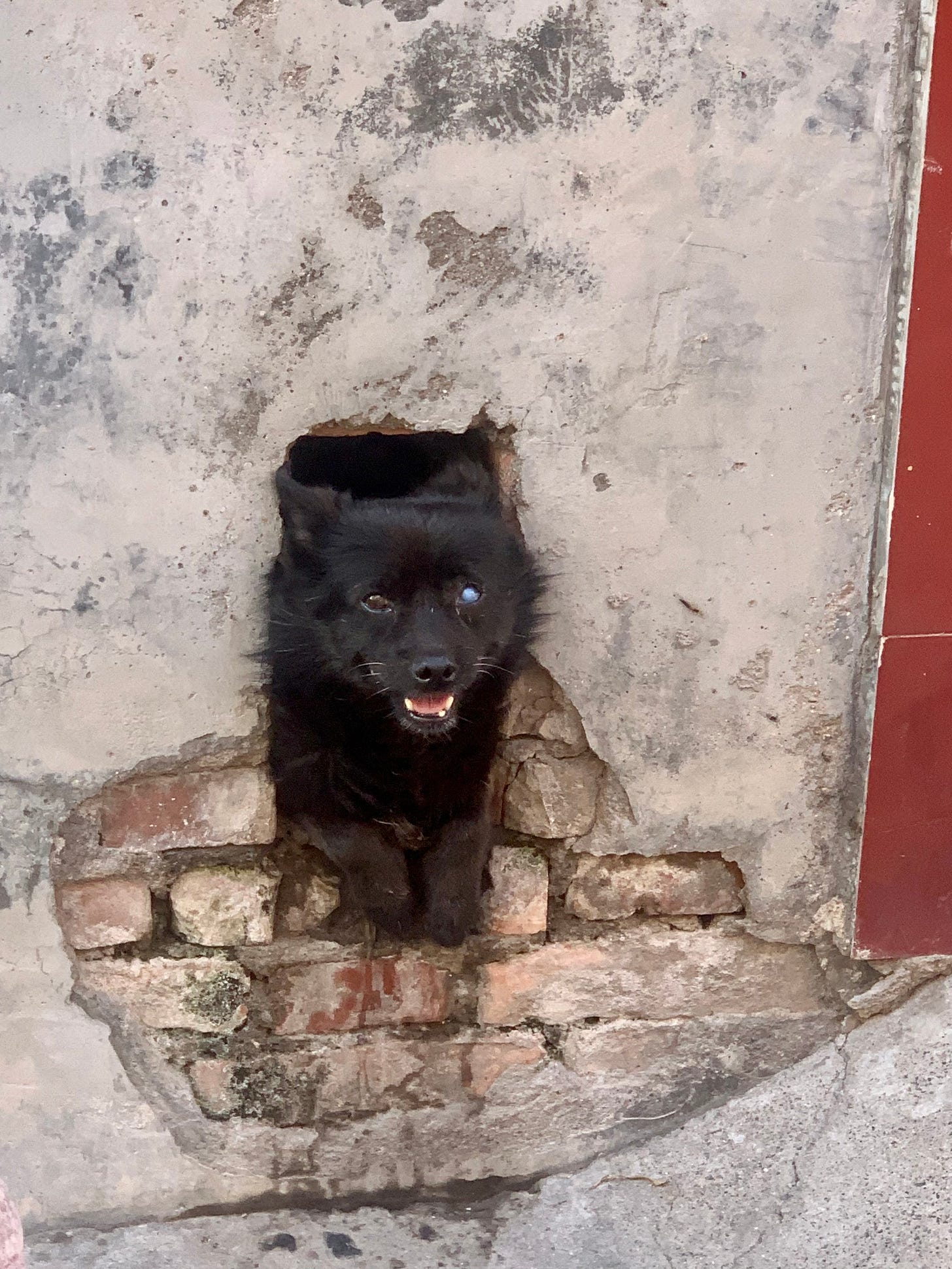No time to read? Listen to it instead. :)
Hiya friends! How’s your week been? On my end, I’ve been busy starting some new projects and brainstorming for our short fiction series. (Get ready for romance, mystery, and heartbreak)!
So, as promised two weeks ago, here is the final post of the “China Travel Log” series. It’s a collection of vignettes, which is just a fancy way of saying short stories without a clear beginning or end. Think of a vintage photograph with a faded border that you found in your attic.
I like how this term captures my emotionally fragmented experience of China. When I’d set off for the other side of the Pacific back in May, I’d expected—wanted the trip to feel like a puzzle with all the pieces neatly locking together to form one cohesive, satisfying picture.
If you read some of my earlier posts such as this one, you’ll quickly notice that I was struggling to understand the experiences I was having and connect with the places I was exploring. Each time I tried writing about China, my mind felt super muddled and incapable of detangling the knot of emotions snared in my chest.
For most of my life, I’ve used writing as a conductor of logic. Expressing abstract notions and feelings with rationally connected sentences is my way of making sense of what sometimes feels like a senseless world.
But I’m not sure this strategy was very successful when applied to my time in China, which is why I’m going to try to swing in the opposite direction. Instead of running away from the emotional messiness of this trip, I’m going to try to embrace it.
Maybe it’s possible to find contentment from appreciating the messiness as it is, without hammering into some tangible shape we think it should be. Maybe it takes letting go of the need for control to regain a sense of control.
I’ll let you decide for yourself. For now, enjoy the rest of this post!
Ashes
I press my fingertips into the hardpack dirt and bow low into the ground once, twice, a third time. When I lift my eyes, I find nainai (paternal grandmother) gazing back at me through a beam of sunlight.
Her black and white portrait is matte. There is no gleam in her eyes, but I immediately recognize the outline of her cheeks and that familiar, askew mouth. Before her is a bowl of rice, a tiny cup of liquor, and three sticks of steadily burning incense, their tips wreathed with smoke.
“An Ma,” my fourth aunt cries, “Your granddaughters have come home to see you. You’d cried and asked for them and your son—,” her voice breaks, “just before you died. They’re here again.”
The sound of stifled sobbing arises around me. My second aunt stands beside me with a bag of traditional burial money while my third aunt tosses handful after handful of the stuff into the small fire leaping in front of the headstone.
I cry but my tears carry a different taste from my aunts’. They cry for what has been. I cry for what could have been.
I don’t know how to mourn a woman I never got to know. I can only mourn the opportunity that was lost, the unfulfilled potential for a close relationship, the heartwrenching question of “what if?”—what if I’d seen her more before she’d passed, what if I’d known what her love felt like?
Somehow, the pain of mourning this lost opportunity at a relationship is just as acute as the pain of mourning the loss of a person.
I shift over to help my third aunt as my sister gets to her knees. The paper bursts into flames and just as quickly, shrivels into a crinkled flower. Within seconds, it’s ashes.
In Chinese customs, it’s believed that burning paper forms of money (yuan bao) and other commodities transport them to your loved ones in the afterlife. It’s a way of showing you care for them and honor them even beyond the grave.
As we feed the last of the yuan bao to the fire, the wind picks up, sending ash and paper petals fluttering around us in a gentle dance.
If what my family and my ancestors believe is true—that the living could send gifts to the dead just by burning them—I wish I could break off a piece of myself, burn it, and send it fluttering to nainai with the rest of the ashes.
Hutong
“There she is!” Yang Yang laughs.
He and our other cousins Zhi Ye and Yuan Yuan sprint toward me as I veer into a narrow alley. The sounds of laughter and sandals slapping against concrete gradually fade into the distance the farther I run. Still, to be safe, I duck left into another alley, sprint for a few seconds, swerve right, sprint, swerve left, swerve right, then right again.
To feel my heart galloping and my hair billowing in the wind feels good—really good. But most of all it feels good to play with reckless abandon, to feel childhood thrill pumping through my veins, anchoring me to the present. In such a moment, you can’t help but appreciate the joy of being alive.
I come to an abrupt halt as I hear Yang Yang’s voice around the corner ahead. Yuan Yuan’s laugh is not too far off either.
“I see her! I see her!”
I spin on my heels and return the way I came.
Yilaolao’s (great-aunt) village is a labyrinth of alleys. Its tortuous layout reminds me of a child’s drawing full of crisscrossing lines, some of which seem to go on forever and others that seem to lead nowhere. But the real personality of the place lies in the details.
Bits of broken tile and bricks litter the paths, forcing you to hopscotch around them while patches of mud threaten to soil your shoes if you aren’t careful. Overgrown clumps of grass line the streets, stubbornly pushing forth from any available crack.
The air smells of dust, wet vegetation, and, occasionally, whiffs of greasy stir fry. I trace the crevices in the weather-worn brick walls as I pass. The warm, grainy mortar leaves streaks of gray across my fingertips, but I don’t wipe them off.
Two elderly women with babies bouncing on their laps turn their heads as I skid into their alley. Behind them, gold Chinese characters heralding some auspicious message gleam on a set of double doors.
This time, instead of racing for the nearest escape, I let my cousins catch me. They point and shriek with delight when they see me cornered.
“See?” Yang Yang beams. “I told you, you can’t outrun us in our own neighborhood.”
Zhi Ye pushes up his glasses and nods in agreement.
I smile and shrug, “Go easy on me next time.”
As we meander back to yilaolao’s house, Yuan Yuan skips beside me, her pigtails bouncing. In a sing-song voice, she declares, “I love xiao hutong (little alley)! Xiao hutong is my home!”
I taste the dust in the air. I survey the stained plaster walls. I listen to the sounds of chickens clucking and children shouting. I see yilaolao waving at us from the front gate. And…I agree. I haven’t been back in over a decade, yet I still love xiao hutong. I still hear the echoes of childhood thrill crystallized in its walls. I hope I always will.
Touch

Laoye’s (maternal grandfather) hands are like blocks of iron—rigid, firm, infallible. He shapes them into a cup and presses them against mine, tangling his arms with mine, pressing and pulling in a steady, fluid motion without beginning or end.
I try to shift my center of gravity with each rotation like he’d taught me, but I’m not particularly good and keep shifting right when I should have turned left, shifting left, when I should have turned right, failing to keep my feet pointed in the right direction.
Laoye drops his arms. “Taichi is about redirecting your opponent’s energy against them,” he says. “Don’t resist their force. Let your body flow with their movements. Let their energy flow through you and then back into them. When you do it correctly, it’ll look like they stumbled on their own. Try again.”
I bend my knees and angle my body towards his. I try to focus on the warmth of his skin as it chafes against mine, the roundness of his joints when I push against his wrists. I close my eyes and inhale the scent of old coats and flour that perpetually perfumes my grandparent’s back room.
I want so desperately to feel the energy circulating between us, but it always feels off, as if I’m trying to spin an elliptical hula hoop that just won’t stay balanced. But Laoye doesn’t give up.
“Push, pull, turn—don’t forget to turn. Push, pull, turn. Good. You’re almost there.”
His eyes crinkle with a smile that hides something more. Maybe disappointment. Maybe longing—longing for the chance to have shared these moments with my sister and me earlier when we were more malleable and had more time with him. I don’t know, and I don’t ask.
When we finish this exercise, he grips my arm and lets me lead him outside for a walk. He’s eighty now and walks with legs as stiff as tree trunks. I remember when I was four, he would swing me into the air and set me on his shoulders. Now, he presses his hands against the wall and his face is tight with effort as he descends just four steps of stairs.
When I slide my hands into his, I find that his grip is still strong. It’s not a strength meant for swinging four year olds onto his shoulders; it’s a strength meant for leaning against walls, leaning against a walking stick, leaning against his grandchildren. Seeing him shuffle forward one patient step at a time, I realize he is stronger now than ever before.
Subscribe to join the adventure!
If you enjoyed today’s article, you’ll enjoy the rest of this newsletter. Subscribe to get a thoughtfully curated selection of travel-related fiction and essays delivered to your inbox every week.
Know somebody who would enjoy this newsletter? Brighten up their day by sharing Macy Sees The World on social media or by sending them a direct link. Thank you for your support! I’ll talk to you next week.








